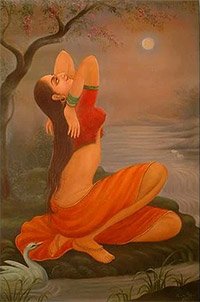Kshobhana, Kṣobhaṇa: 10 definitions
Introduction:
Kshobhana means something in Hinduism, Sanskrit. If you want to know the exact meaning, history, etymology or English translation of this term then check out the descriptions on this page. Add your comment or reference to a book if you want to contribute to this summary article.
The Sanskrit term Kṣobhaṇa can be transliterated into English as Ksobhana or Kshobhana, using the IAST transliteration scheme (?).
In Hinduism
Shaktism (Shakta philosophy)
Source: Google Books: ManthanabhairavatantramKṣobhaṇa (क्षोभण) refers to “arousal”, according to the Ṣaṭsāhasrasaṃhitā, an expansion of the Kubjikāmatatantra: the earliest popular and most authoritative Tantra of the Kubjikā cult.—Accordingly, “This Vidyā, when applied, brings about Melting, Arousal [i.e., kṣobhaṇa], Attraction, Subjugation and all the works of magic from peace to murder. O goddess, in this way the (Triple) Vidyā, in relation to (its) parts and, conjoined with the (appropriate) adjuncts and the qualities, performs many such magical acts”.

Shakta (शाक्त, śākta) or Shaktism (śāktism) represents a tradition of Hinduism where the Goddess (Devi) is revered and worshipped. Shakta literature includes a range of scriptures, including various Agamas and Tantras, although its roots may be traced back to the Vedas.
Kama-shastra (the science of Love-making)
Source: Brill: Śaivism and the Tantric Traditions (kāmasūtra)Kṣobhaṇa (क्षोभण) (Cf. Kṣobha) refers to “stimulating” (the female genitalia), according to the Kāmasūtra of Vātsyāyana and Jaśodhara’s commentary called the Jayamaṅgalā .—Accordingly, “[Commentary on verse 7.2.2]:—‘about to practice sex’: at the beginning of the sexual act. This is at the start [of the sexual act]. Even if the passion is weak with regards to sex because the penis is inert, first ‘her genitalia’, i.e. her vulva, should be rubbed with his hand, should be stimulated (kṣobhaṇa) with the ‘elephant trunk’ [method]...”.

Kamashastra (कामशास्त्र, kāmaśāstra) deals with ancient Indian science of love-making, passion, emotions and other related topics dealing with the pleasures of the senses.
Pancaratra (worship of Nārāyaṇa)
Source: Shodhganga: Kasyapa Samhita—Text on Visha Chikitsa (p)Kṣobhaṇa (क्षोभण) refers to the “trembling” (of the three worlds), and is used to describe Garuḍa, according to the Viṣvaksena Samhitā (verse 26.61) which mentions the efficacy of the Garuḍa-mantra by paying obeisance to him.—It mentions that Garuḍa also renowned as Suparṇa, the king of birds and the illustrious son of Vinatā, is adorned by the eight divine serpents residing in the seven nether-worlds; his body is smeared with the blood of serpents he has slain. Garuḍa is eulogised as the vehicle of Viṣṇu, who can make the three worlds tremble (trailokya-kṣobhaṇa) with his primal strength, and who conquered Brahmā and the other gods (and brought the nectar) to free his mother from bondage:

Pancaratra (पाञ्चरात्र, pāñcarātra) represents a tradition of Hinduism where Narayana is revered and worshipped. Closeley related to Vaishnavism, the Pancaratra literature includes various Agamas and tantras incorporating many Vaishnava philosophies.
Languages of India and abroad
Sanskrit dictionary
Source: DDSA: The practical Sanskrit-English dictionaryKṣobhaṇa (क्षोभण).—[kṣubh-ṇic lyuṭ]
1) Agitating, disturbing.
-ṇaḥ One of the five arrows of Kāmadeva.
2) An epithet of (a) Viṣṇu, (b) Śiva.
Derivable forms: kṣobhaṇam (क्षोभणम्).
Source: Cologne Digital Sanskrit Dictionaries: Benfey Sanskrit-English DictionaryKṣobhaṇa (क्षोभण).—i. e. kṣubh + ana, adj. Shaking, [Rāmāyaṇa] 3, 36, 10.
Source: Cologne Digital Sanskrit Dictionaries: Cappeller Sanskrit-English DictionaryKṣobhaṇa (क्षोभण).—[adjective] shaking, agitating; [neuter] = [preceding]
Source: Cologne Digital Sanskrit Dictionaries: Monier-Williams Sanskrit-English Dictionary1) Kṣobhaṇa (क्षोभण):—[from kṣubh] mfn. shaking, agitating, disturbing, causing emotion, [Ṛg-veda x, 103, 1; Rāmāyaṇa iii, 36, 10]
2) [v.s. ...] m. Name of Śiva, [Mahābhārata xii, 10384]
3) [v.s. ...] of Viṣṇu, [ib. xiii, 6990]
4) [v.s. ...] Name of one of the five arrows of the god of love, [Gīta-govinda viii, 1 [Scholiast or Commentator]]
Source: DDSA: Paia-sadda-mahannavo; a comprehensive Prakrit Hindi dictionary (S)Kṣobhaṇa (क्षोभण) in the Sanskrit language is related to the Prakrit words: Khuṃbhaṇa, Khubbhaṇa, Khobhaṇa.
[Sanskrit to German]
Sanskrit, also spelled संस्कृतम् (saṃskṛtam), is an ancient language of India commonly seen as the grandmother of the Indo-European language family (even English!). Closely allied with Prakrit and Pali, Sanskrit is more exhaustive in both grammar and terms and has the most extensive collection of literature in the world, greatly surpassing its sister-languages Greek and Latin.
See also (Relevant definitions)
Ends with: Manonmattavikshobhana, Prakshobhana, Samkshobhana, Trailokyakshobhana, Vikshobhana.
Full-text: Khumbhana, Prakshobhana, Khubbhana, Khobhana, Samkshobhana, Vikshobhana, Kshobha.
Relevant text
Search found 3 books and stories containing Kshobhana, Kṣobhaṇa, Ksobhana; (plurals include: Kshobhanas, Kṣobhaṇas, Ksobhanas). You can also click to the full overview containing English textual excerpts. Below are direct links for the most relevant articles:
Rig Veda (translation and commentary) (by H. H. Wilson)
Rig Veda 10.103.1 < [Sukta 103]
The Skanda Purana (by G. V. Tagare)
Chapter 85 - Granting of Boons to Durvāsas < [Section 2 - Uttarārdha]
The Brahma Purana (by G. P. Bhatt)